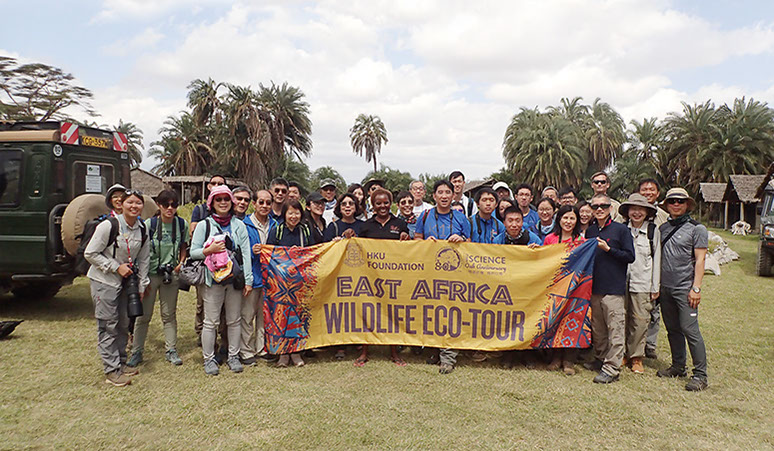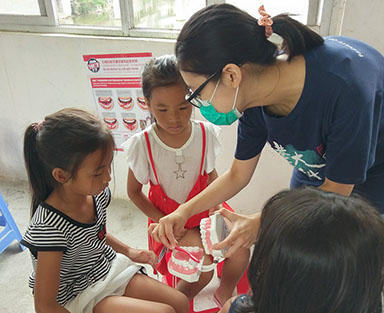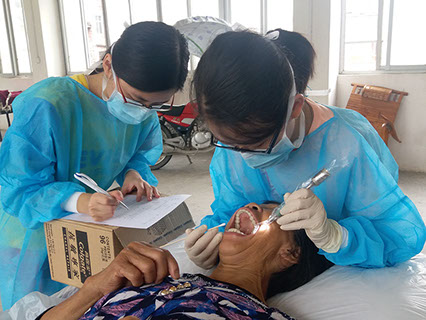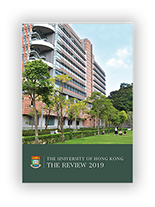
In July 2019, 15 students from the Faculty of Science adopted the role of eco-leaders and teamed up with 17 HKU alumni and HKU Foundation members in the HKU East Africa Wildlife Eco-Tour led by Dr Billy Hau from the School of Biological Sciences to experience the legendary Great Migration and promote nature conservation.
New interdisciplinary degrees launched in 2018–19, in addition to our existing requirement that all students learn beyond their major, are enabling HKU to produce graduates with the critical thinking skills and adaptability to address the challenges of the 21st century.
HKU is a leader in Hong Kong in embracing interdisciplinary education. Our innovative Common Core, which attracted widespread interest from around the world when it was launched in 2012, has given us deep experience in bringing together students from different disciplines to address the complexities of 21st-century life from multiple perspectives. In 2019 we ramped up that approach with the launch of the Bachelor of Arts and Sciences (BASc), a rigorous curriculum that crosses intellectual boundaries and cultivates leadership abilities.

The inaugural Global Liberal Arts Design Experiments (GLADE) symposium was held at HKU in June 2019.
More than 100 top-performing students were admitted to the BASc programmes in September 2019, which include a general BASc and five BAScs in Financial Technology, Applied Artificial Intelligence (AppliedAI), Design+, Global Health and Development, and Social Data Science. Students acquire both broad and specialised knowledge – for example, in the BASc(AppliedAI) they learn the fundamental science and engineering skills for building AI systems, as well as the philosophical and ethical questions that AI evokes – and undergo training in leadership and big data and attend a Foundations of Human Knowledge course that looks at intellectual development across human history, from ancient China and ancient Greece up to the present day.
The Common Core itself, meanwhile, continued to gain recognition and evolve in 2019, when it received the UGC [University Grants Committee] Teaching Award (Team) for teaching excellence. Only three teaching awards are bestowed across Hong Kong each year, so this was a great honour. The Common Core also expanded beyond our campus, with the launch of the China Liberal Arts Summer Sessions (CLASS) with partner institutions in the Mainland and of Responsive4U, a UGC-funded $15 million programme to share General Education and Common Core courses among HKU, the Hong Kong Polytechnic University, the Hong Kong University of Science and Technology, and the Chinese University of Hong Kong (see Common Core Kudos). In addition, the Common Core team has taken the lead to bring together research-intensive universities from around the world that are committed to enhancing holistic liberal arts education through the formation of the Global Liberal Arts Design Experiments (GLADE), which held its inaugural symposium at HKU in June 2019. The team is now initiating collaborations on sharing modules, courses and projects through the co-creation of a Global Civic University that will focus on relationships between universities and their host urban localities.
Apart from encouraging students to cross disciplinary boundaries, the University also wants them to cross physical ones. Our Horizons programme provides every student with the opportunity to have a learning experience in Mainland China and overseas if they so wish. To support that goal, the highly successful Project Mingde – which originated in the Faculty of Engineering in 2003 and has built schools, dormitories, toilets and bridges in impoverished communities in Mainland China and Vietnam – has now become the University-wide programme Horizons Project Mingde. Individual units of the University have also taken the initiative to launch their own external programmes with partners, such as the Sau Po Centre on Ageing which offered a summer programme on ageing with Peking University for both undergraduate and postgraduate students.
Internationalisation is also shaping many of our programmes. The University has dual degrees with some of the world’s top universities, which allow undergraduate students to study at and be conferred degrees by both institutions. In 2018–19, we announced a new dual degree in Law and Business with Peking University, which admitted its first students in September 2019, and two new dual degrees with Tsinghua University in Business and Economics and Computer Science and Technology, which will be available soon. These are in addition to our existing dual degrees with such institutions as University College London, Sciences Po and the University of California, Berkeley.
HKU’s commitment to both excellence and opportunity is enabling the University to attract high-performing students from around the world. In 2019, our student intake again registered the highest average HKDSE [Hong Kong Diploma of Secondary Education Examination] admission scores of all universities across the four core subjects of Chinese, English, Liberal Studies and Mathematics, as well as in combined scores. We also admitted the very best students – including top scorers from Hong Kong, the Mainland and overseas. We received more than 15,000 applications in total from applicants outside Hong Kong. These results are a welcome sign that the education offered at HKU is widely regarded as relevant and fit-for-purpose in preparing students to develop professional and personal capabilities and tackle the exciting and difficult challenges facing modern society.


Dentistry students in the University‘s Horizons Project Mingde went to Guangxi to provide dental examinations and oral hygiene education to villagers.
11
top scorers
11 HKU candidates achieved 5** in six or more subjects in the Hong Kong Diploma of Secondary Education Examination (HKDSE).
8,000+
global and Mainland China experiences
Students went to Mainland China and all five continents to undertake learning activities of all durations and academic levels.
99.3%
employment
For the 13th consecutive year, graduates achieved full employment (including the pursuit of further studies). The figure is for UGC-funded students who graduated
in 2017–18.
75
students with special backgrounds
64 local non-Chinese speaking students were admitted through JUPAS, the most of all the universities, as well as 11 students with special educational needs.
Teaching and Learning
Crossing Boundaries
2018_%20.png?crc=3873734352)
PDF Version
Past Issues
Vision and Mission
An Extract from
the University’s
Annual Accounts 2018–19
The University Profile
Officers of the University
The Court
Teaching and Learning
Research and Innovation
Knowledge Exchange and
Technology Transfer
Message from the
President and
Vice-Chancellor
E-Book
